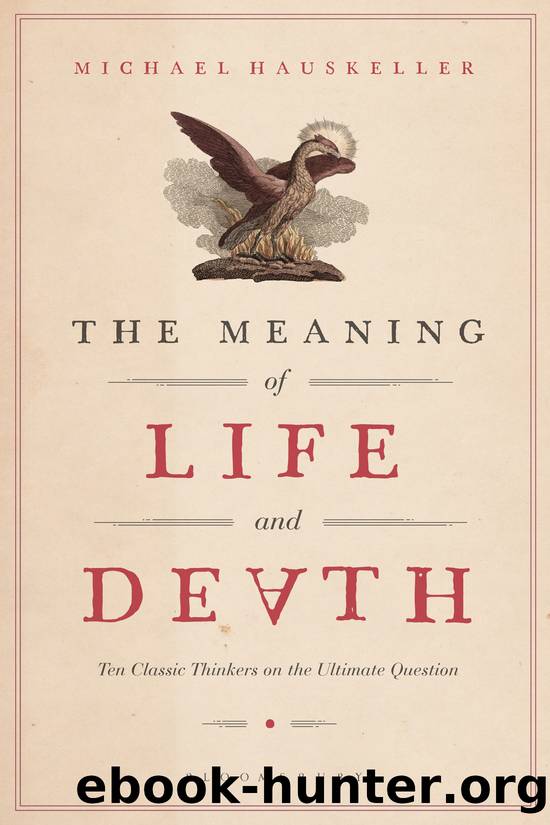The Meaning of Life and Death by Michael Hauskeller;

Author:Michael Hauskeller;
Language: eng
Format: epub
ISBN: 9781350073661
Publisher: Bloomsbury UK
CHAPTER SEVEN
The dramatic richness of the concrete world
William James (1842–1910)
Making a difference
‘There can be no difference anywhere that doesn’t make a difference elsewhere’ (P, 50), writes William James in his book Pragmatism (1907). ‘Pragmatism’ is the name that James gives to a particular philosophical attitude of orientation and method of inquiry that is more interested in fruits than in roots, more in consequences than in first principles. It operates on the assumption that in order to understand what a claim means we need to understand what the practical effects of it being true or false would be. If it makes, in practical terms, no difference to us whether or not a certain proposition is true, then that proposition is, for all intents and purposes, meaningless. If we, for instance, debate the question whether there is such a thing as free will, then we have good reason to do so only if something depends on there being or not being free will. How we answer that question needs to have an effect on how we act, or at least on what we can expect to happen to us in the future. We need to ask ourselves: Does it really make a difference whether our will is ‘free’ or causally determined? Does it really matter whether we could have done something other than we actually did (if that is what we mean by ‘free’ here)? If we find that it makes no noticeable difference one way or the other, then ‘free will’ is a meaningless notion, and we can stop arguing about it. If it does, then it has meaning to the extent that it does, and what it means is exactly the difference that it makes.1
James recommends that we use the pragmatic method to resolve contentious metaphysical issues, such as whether the world is one or many, in its essence material or spiritual, the product of design or chance. We will then see whether it makes a difference, and if it does, what that difference consists in. James does not say so explicitly, but it is clear that questions about meaning in life can and should be subjected to the same test. When we ask whether life in general, or a particular individual life, is meaningful or meaningless, we need to first clarify what difference it makes whether or not life has a meaning. We need to ask what the practical cash-value of ‘meaningfulness’ is, which requires identifying its place in the stream of experience. For James, what is not experienced in some way by someone is not real. It is not real because what is never experienced in any way by us cannot make any difference to us. It could just as well not exist. Experience, however, is tied to action. It changes our behaviour, and if it does not seem to do that, then we have not really experienced anything at all. So in what way is a life that is meaningful pragmatically different from one that is not?
Download
This site does not store any files on its server. We only index and link to content provided by other sites. Please contact the content providers to delete copyright contents if any and email us, we'll remove relevant links or contents immediately.
The remains of the day by Kazuo Ishiguro(7551)
Tools of Titans by Timothy Ferriss(6946)
The Black Swan by Nassim Nicholas Taleb(6190)
Inner Engineering: A Yogi's Guide to Joy by Sadhguru(5895)
Giovanni's Room by James Baldwin(5878)
The Way of Zen by Alan W. Watts(5799)
The Six Wives Of Henry VIII (WOMEN IN HISTORY) by Fraser Antonia(4790)
The Power of Now: A Guide to Spiritual Enlightenment by Eckhart Tolle(4755)
Astrophysics for People in a Hurry by Neil DeGrasse Tyson(4620)
Asking the Right Questions: A Guide to Critical Thinking by M. Neil Browne & Stuart M. Keeley(4574)
12 Rules for Life by Jordan B. Peterson(3734)
The Ethical Slut by Janet W. Hardy(3502)
Skin in the Game by Nassim Nicholas Taleb(3460)
Housekeeping by Marilynne Robinson(3401)
The Art of Happiness by The Dalai Lama(3382)
Double Down (Diary of a Wimpy Kid Book 11) by Jeff Kinney(3272)
Skin in the Game: Hidden Asymmetries in Daily Life by Nassim Nicholas Taleb(3264)
Walking by Henry David Thoreau(3234)
12 Rules for Life: An Antidote to Chaos by Jordan B. Peterson(3200)
